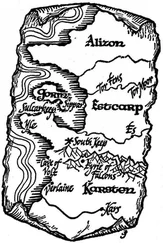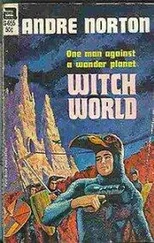Andre Norton - Three Against the Witch World
Здесь есть возможность читать онлайн «Andre Norton - Three Against the Witch World» весь текст электронной книги совершенно бесплатно (целиком полную версию без сокращений). В некоторых случаях можно слушать аудио, скачать через торрент в формате fb2 и присутствует краткое содержание. Жанр: Фэнтези, на английском языке. Описание произведения, (предисловие) а так же отзывы посетителей доступны на портале библиотеки ЛибКат.
- Название:Three Against the Witch World
- Автор:
- Жанр:
- Год:неизвестен
- ISBN:нет данных
- Рейтинг книги:5 / 5. Голосов: 1
-
Избранное:Добавить в избранное
- Отзывы:
-
Ваша оценка:
- 100
- 1
- 2
- 3
- 4
- 5
Three Against the Witch World: краткое содержание, описание и аннотация
Предлагаем к чтению аннотацию, описание, краткое содержание или предисловие (зависит от того, что написал сам автор книги «Three Against the Witch World»). Если вы не нашли необходимую информацию о книге — напишите в комментариях, мы постараемся отыскать её.
Three Against the Witch World — читать онлайн бесплатно полную книгу (весь текст) целиком
Ниже представлен текст книги, разбитый по страницам. Система сохранения места последней прочитанной страницы, позволяет с удобством читать онлайн бесплатно книгу «Three Against the Witch World», без необходимости каждый раз заново искать на чём Вы остановились. Поставьте закладку, и сможете в любой момент перейти на страницу, на которой закончили чтение.
Интервал:
Закладка:
Dawn found me back on the lookout ridge. The fires still burned, more difficult to see with the coming of light. I searched for the horses. It was a long and anxious moment before my lenses picked them up, moving across an open glade. And I was startled. There were riders in those saddles, and they would truly have deceived me had I been on scout. They would be watching, those others, and they would see their prey returning. How good the illusion would be at close quarters, I could not guess. But for the time we were covered.
Kemoc joined me and we took turns watching the horses, until a fold in the earth concealed them from us. Then we went down to inspect the cliff wall. It was rough enough to promise adequate holds, and not far from the top was a ledge of some depth to afford a resting place. As to what lay beyond its crests we did not know, but neither could we say that we would be faced by something we could not surmount.
For that day we rested in camp, sleeping so deeply in turn that no dreams troubled us. And Kaththea recovered that strength which had been drawn from her in the weaving of illusion. At the first shadow of night I climbed the ridge again. This time there was no sparkle of watchfires, nor did we sight any later in the night. What this could mean might be either of two things: Kaththea’s painfully wrought illusions might have provided the waiting company with prisoners for a space—or they had speedily discovered the trickery, struck camp, and were moving on. Yet a most painstaking use of the lenses, studying each bit of cover which might attract a stalking hunt, showed nothing amiss.
“I think they are truly gone,” Kaththea said with a confidence I did not altogether share. “But it does not matter. In the morning we shall go also, up and back—there.” She pointed to the mountain.
And in the morning we did go. Our provisions, weapons and blankets were made into packs which Kemoc and I shouldered. And roped between us both was Kaththea, her hands free, no weight upon her. She had discarded the eye bandage, but still kept her eyes closed, striving to “see” through mind contact, since she was still in the confusing fog.
It was slow work, that upward pull, and I found it doubly hard when I had to concentrate not only on my own efforts, but as an aid for Kaththea. She showed a surprising dexterity in spite of her self-imposed blindness, never fumbling or missing a hold I pictured in my mind. But when we reached the ledge I was so weak with fatigue I feared it was not in me to pull up the last short way. Kemoc reached across Kaththea as she crouched between us, his hand falling on my shaking knee.
“The rest to me,” he stated as one who would not be denied.
Nor could I have fought him for that danger. I was too spent to risk their safety on my own fast failing strength. So from the rest we reversed and my brother took the lead, his face as rigid with concentration as mine must have been. For I discovered my chin stiff, my jaw aching with pressure when I had come to those moments of relaxation.
It was lucky that I had given way to Kemoc, for the last part of that climb was a nightmare. I forced my trembling body to the effort, knowing well the danger of pulling back upon the rope and distracting Kaththea. But there came an end and we were on a space almost wide enough to be a plateau.
There was a cold wind here which dried our sweat, chilled us. So we pressed on hurriedly to where two peaks jutted skyward, a shadowed cleft between them. And when we entered that slash Kaththea suddenly flung back her head and opened her eyes, giving a small but joyful cry. We did not need any words to know that her blindness was gone.
The cleft we entered intensified the cold of those heights. Kemoc scuffed a boot toe through a patch of white and I saw that he had kicked up snow. Yet this was summer and the heat of the year had weighed heavily on us below. We stopped to undo our packs and bring out the blankets, pulling them cloakwise about our shoulders. That helped in a small measure as we came to the end of the cleft and looked down—into the world of the unknown.
Our first impression was one of stark disbelief.
There was a kind of wrongness about the broken land which receded down and down from our present perch, into a misty lowland so hidden we could not tell whether land or water, or both, lay far below. All I could think of was a piece of cloth which had been soaked in thin mud and then twisted by hand before being allowed to dry, so that a thousand wrinkles ran this way and that without sane purpose. I had thought that I knew mountain country, but this cut up land was worse than the foothills we had passed.
Kaththea was breathing deeply, not just as one who would fill her lungs, but as if she could separate some one scent from many, and identify it, as a hound or a snow cat could identify a hunting trace.
“There is that here—” she began, and then hesitated. “No, I make no judgments. But this land has felt the lash of a fury which was man-born and not the stroke of nature. Only that was long and long ago, and the destruction is under mend. Let us get from this place; I do not like my winds ice-tipped.”
In one way the broken nature of the descent served us well—for while the finding of the way was time consuming, yet the terrain was so rough here there were natural stairways of rock to be discovered. Since Kaththea was now sure of her sight, we made far better time than we had on the other side of the mountain.
However, the mist which choked the lower lands still curtained them from us, and that did not inspire confidence. There was this also: on the other side of the mountain, broken as the way had been, there had been life. I had seen fresh tracks of animals, and we had noted birds, even though their number had been few. But here were no such signs of life. We were down from the bare rock and into the first circle of vegetation to find that this had a strange look. The green of the narrow bush leaves was lighter in shade than that we had always known, and the very shape of the leaves had a shriveled appearance as if they had been born from blighted seeds.
It was when we came out at the head of a valley that I called a halt. The territory below was even more unbelievable than that we had sighted from the pass. At first I could not really tell the nature of what I looked upon. Then, glancing about me, the sight of seedlings spreading from that growth gave me the answer to that choked gap. They must be trees, for no bush grew to such a height, but they were no normal tree. And they must have grown so for centuries of time, for they completely filled the valley, their tips reaching only a few feet below the rocky point on which we now stood.
Sometime in the distant past they had begun as might any normal tree, but when their boles had reached perhaps ten feet above the ground surface they had taken a sharp bend left or right. After proceeding in that new direction for some feet, they again pointed skyward, to repeat the process again and again, lacing a vast criss-cross of such branched levels, with the true ground of the valley far below. To cross this we would have to walk the branches, for the woven growth gave no chance of penetration any lower, which meant balancing from limb to limb, with fear that a slip meant either a bone breaking fall or even impalement on one of those shooting uptips.
I edged back from our vantage point. “For this I want a full day.”
Kaththea shaded her eyes from the last sun rays, reflected glitteringly from some quartz in the rocks. “That is truth. But it is cold here—where can we shelter?”
Kemoc found protection, a crevice about which we piled other stones until the three of us, huddling closely into that crack, could endure the chill.
There was wood, but none of us suggested a fire. Who knew what eyes might pick up a spark on a mountain side where no spark should rightly be, or what might be drawn to investigate such a phenomena? Kemoc and I had lain rough before, and Kaththea made no complaint, we putting her between us and bringing the blankets about us all.
Читать дальшеИнтервал:
Закладка:
Похожие книги на «Three Against the Witch World»
Представляем Вашему вниманию похожие книги на «Three Against the Witch World» списком для выбора. Мы отобрали схожую по названию и смыслу литературу в надежде предоставить читателям больше вариантов отыскать новые, интересные, ещё непрочитанные произведения.
Обсуждение, отзывы о книге «Three Against the Witch World» и просто собственные мнения читателей. Оставьте ваши комментарии, напишите, что Вы думаете о произведении, его смысле или главных героях. Укажите что конкретно понравилось, а что нет, и почему Вы так считаете.









